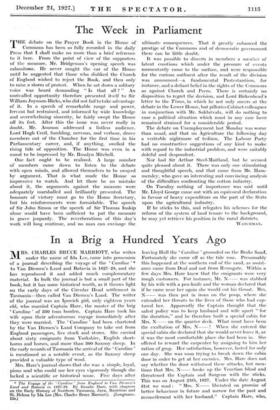The Week in Parliament
THE debate on the Prayer Book in the House of Commons has been so fully recorded in the daily Press that I shall make no more than a brief reference to it here. From the point of view of the supporters of the measure, Mr. Bridgeman's opening speech was calamitous. He never caught the ear of the House until he suggested that those who disliked the Church of England wished to reject the Book, and then only to raise a storm of protest. When he sat down a solitary voice was heard demanding "Is that all ? " An unrivalled opportunity therefore presented itself to Sir William Joynson-Hicks, who did not fail to take advantage of it. In a speech of remarkable range and power, fervent but restrained, and informed by wide knowledge and overwhelming sincerity, he fairly swept the House off its feet. After this the issue was never really in doubt. Mr. .Ammon addressed a listless audience. Lord Hugh Cecil, fumbling, nervous, and verbose, drove members out of the Chamber for the first time in his Parliamentary career, and, if anything, swelled the rising tide of opposition. The House was even in a mood to be impressed by Mr. Rosslyn Mitchell.
One fact ought to be _ realized. A large number of members came down to listen to the debate with open minds, and allowed themselves to be swayed by argument. That is what made the House so impressive to watch. And let there be no mistake about it, the arguments against the measure were adequately marshalled and brilliantly presented. The honours of victory must go to the Home Secretary, but his reinforcements were formidable. The speech of Sir John Simon or the speech of Sir Thomas Inskip alone would have been sufficient to put the measure in grave jeopardy. The reverberations of this day's work will long continue, and no man can envisage the ultimate consequences. That it greatly enhanced the prestige of the Commons and of democratic government there can be little doubt.
It was possible to discern in members a number of latent emotions which under the pressure of events momentarily came to the surface, and were responsible for the curious outburst after the result of the division was announced—a fundamental Protestantism, for instance, and a defiant belief in the rights of the Commons as against Church and Peers. There is certainly no disposition to regret the decision, and Lord Birkenhead's letter to the Times, in which he not only sneers at the debate in the Lower House, but pillories Cabinet colleagues in conjunction with Mr. Saklatvala, will do nothing to ease a political situation which must in any case have remained strained for a considerable period.
The debate on Unemployment last Monday was worse than usual, and that on Agriculture the following day a veritable nightmare of tedium. The Labour Party had no constructive suggestions of any kind to make with regard to the industrial problem, and were suitably doleful and• despondent.
Nor had Sir Arthur Steel-Maitland, but he seemed quite pleased about it. There was only one stimulating and thoughtful speech, and that came from Mr. Ham- mersley, who gave an interesting and convincing analysis of the difficulties confronting the cotton industry.
On Tuesday nothing of importance was said until Mr. Lloyd George came out with an equivocal declaration in favour of heavy expenditure on the part of the State upon the agricultural industry.
If he sticks to this, and relegates his schemes for the reform of the system of land tenure to the background, he may yet retrieve his position in the rural districts.
WATCHMAN.






























 Previous page
Previous page